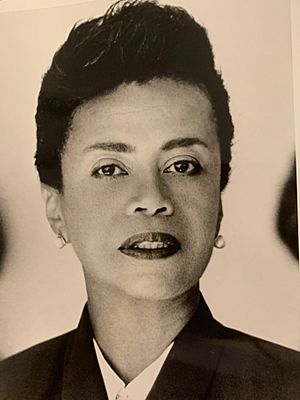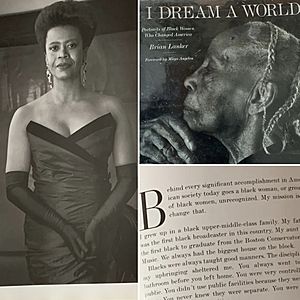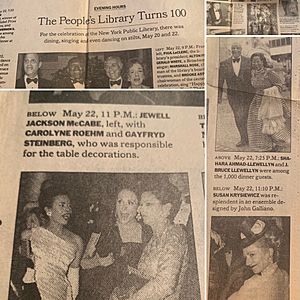Jewell Jackson McCabe facts for kids
Quick facts for kids
Jewell Jackson McCabe
|
|
|---|---|

Jewell in 1993
|
|
| Born |
Jewell Alyce Jackson
August 2, 1945 Washington, D.C., U.S.
|
| Education | The High School of Performing Arts |
| Alma mater | Bard College (BA) |
| Occupation |
|
| Spouse(s) |
Frederick E. Ward
(m. 1964; div. 1975)Eugene L. McCabe
(m. 1975; div. 1984) |
| Partner(s) | Eugene L. McCabe (1967-1975) |
| Parents |
|
| Relatives | Harold B. Jackson Jr. (brother) |
Jewell Jackson McCabe, born on August 2, 1945, is an American leader who has worked for equal rights, in business, and in politics. She is known for her important role in the National Coalition of 100 Black Women. This group works to empower Black women across the United States.
In the mid-1970s, Jewell was a key leader and spokesperson for the movement in New York City. She then founded the national organization, helping it grow throughout the 1980s and 1990s. In 1993, she almost became the president of the NAACP, a major civil rights organization. Jewell also worked with other strong African American women leaders. They all agreed on one thing: they opposed the Million Man March because it did not include Black women.
Early Life and Family
Jewell Jackson was born in Washington, D.C., on August 2, 1945. Her parents were Harold "Hal" B. Jackson and Julia Jackson. Her father, Hal Jackson, was a famous radio broadcaster. He and his partner, Percy E. Sutton, started a company called Inner City Broadcasting. This company owned many radio stations, including WBLS-FM. Hal Jackson was known as the "Godfather of Black Radio" because he helped many artists get their start.
Jewell's mother, Julia, was also very active in community groups like The Links, Incorporated, and Jack and Jill. Jewell was also influenced by her aunts. Her aunt Alice was one of the first teachers to help integrate schools in Washington, D.C., meaning she helped bring students of all races together. Another aunt, Essie Goldwire, was the first Black person to graduate from the Boston Conservatory of Music.
Jewell's older brother, Hal B. Jackson, Jr., became the first African-American judge in Wisconsin in 1972. He was appointed by Governor Pat Lucy.
Making a Difference
Jewell Jackson McCabe joined the board of the Women's Forum in 1975. In 1977, she helped create a group called WUNY (Women United for New York). This group worked to support New York City after it faced money problems. Jewell, along with other women leaders, showed how important women's leadership was to the city's economy.
Jewell also ran her own company that helped other businesses with their communication and marketing. One of her big projects was the Panasonic Kid Witness News program. She managed this program for ten years. It taught fifth and sixth graders how to make videos. Jewell expanded the program from a few schools in New York to 200 schools across 35 states. She created training videos for teachers and students. Panasonic gave each school a fully equipped video studio. The program ended with a fun "A-kid-emy Awards" dinner where students' videos were celebrated.
Jewell was also appointed to important government positions. In 1994, President Bill Clinton chose her to be the first African American member of the U.S. Holocaust Memorial Council. This council oversees the Holocaust Museum. She also served on the Committee on Conscience, which works to prevent genocide. Governor Mario M. Cuomo of New York also appointed Jewell to lead councils focused on the state's economy and job training.
Awards and Recognition
Jewell Jackson McCabe became an honorary member of Alpha Kappa Alpha. This was the first sorority for Black women, founded in 1908.
In April 1993, Jewell was one of the top candidates for the presidency of the NAACP.
Images for kids
-
NORTHSIDE CENTER —Where Children Rise Up and Thrive Gala — Left to Right — Eugene "Gene" McCabe, President, North General Hospital; Jewell Jackson McCabe, Founding President, NCBW; Dr. Mamie Phipps Clark & Dr. Kenneth B. Clark, Renowned American Psychologists & Historic Witnesses in Briggs v. Elliott (1952) pivotal case in Brown v. Board of Education (1954).
-
Ebony (magazine) feature story on Jewell Jackson McCabe her founding the National Coalition of 100 Black Women and establishing their signature awards recognition the Candace Award held annually at New York City's Metropolitan Museum of Art.
 | Dorothy Vaughan |
 | Charles Henry Turner |
 | Hildrus Poindexter |
 | Henry Cecil McBay |





